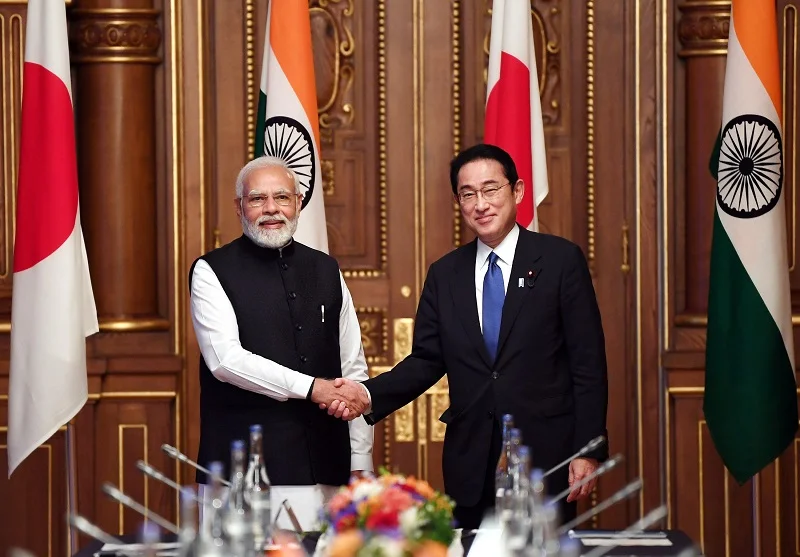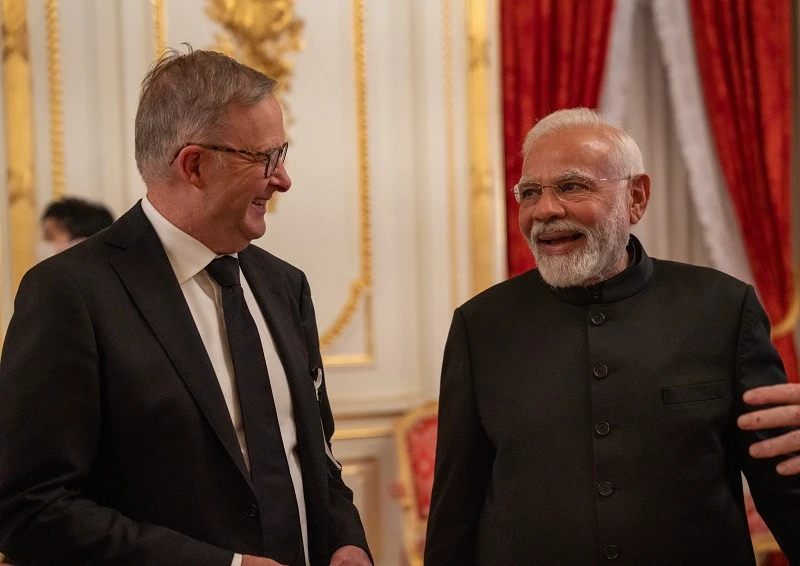

A file photo of PM Narendra Modi with the Japanese Prime Minister Fumio Kishida (Image courtesy: PIB)
Over the next two weeks, Australia and Japan are expected to discuss threadbare China’s aggressive stance when the Prime Ministers of the two countries visit India. The dialogue will be informed by the need to protect the Indo-Pacific region – home to more than half the world’s population and 60 per cent of the global economy.
While Australian Prime Minister Anthony Albanese is arriving Wednesday, Japanese Prime Minister Fumio Kishida will land in New Delhi on March 19 to further strengthen the India-Japan Special Strategic and Global Partnership.
The top-level visits take place immediately after foreign ministers of the four-nation Quad grouping of India, the United States, Japan and Australia met in the Indian capital last week.
It was presided by External Affairs Minister S Jaishankar and attended in person by the US Secretary of State Antony Blinken, Japanese Foreign Minister Yoshimasa Hayashi and Australian Foreign Minister Penny Wong.
The grouping asserted in New Delhi that peace and security in the maritime domain underpins the development and prosperity of the Indo-Pacific region.
It also expressed “serious concern” at the militarisation of disputed features, the dangerous use of coast guard vessels and maritime militia, and efforts to disrupt other countries’ offshore resource exploitation activities.


Analysts believe that when Prime Minister Narendra Modi meets Albanese and Kishida this time, the “hot topic of discussion” will be forging defence cooperation and setting up resilient global supply chains due to the ongoing Ukraine war and Chinese belligerence in the Indo-Pacific with the Xi Jinping regime hiking its military budget to USD 225 billion, which is more than the combined budgets of India (USD 73 billion), Australia (USD 48.7 billion) and Japan (USD 51 billion).
“The picture of which countries China considers as adversaries become clear as any military emergency over Senkaku Islands or neighbouring Taiwan will seriously impact Japan, and military consolidation in Tibet and Xinjiang will put pressure on India. Backed by ambitious Beijing, the Chinese PLA is in an expansionist mode and is running into friction with Australia as Xi Jinping forges military cooperation in the Far Pacific and along with Russia has hit out at the AUKUS alliance,” wrote Shishir Gupta in The Hindustan Times.
As reported by IndiaNarrative.com earlier, the Albanese government has already committed to place India “at the heart of Australia’s approach” to the Indo-Pacific and beyond.
Australia’s Deputy Prime Minister and Minister for Defence Richard Marles has maintained that though it would be wrong to assume that China is at the centre of every decision being made to deeper Australian-Indian security cooperation, Beijing’s military build-up is now “the largest and most ambitious” seen by any country since the end of the Second World War.
Also Read: Hike in its military budget shows China’s aggressive intent in three contentious theatres
On Friday, while attending the Quad Foreign Ministers’ Panel at the Raisina Dialogue in New Delhi, Australian Foreign Minister Penny Wong acknowledged that India is a “civilizational power” which brings a different perspective to some of the challenges of the current times.
“I could talk about the extent to which India is a critical power, a great power in the region, that there is no reshaping of the Indo-Pacific with the attributes that Australia would seek without India. I’d also make the point – and I think we’ve seen that in not only in how Jai (Jaishankar) engages with the world and his narrative around it, but also Prime Minister Modi,” said Wong.
On the same day, Japanese Foreign Minister Yoshimasa Hayashi held an hour-long meeting with Jaishankar where the duo not only exchanged views on India’s G20 and Japan’s G7 presidency but also on the situation in Sri Lanka, a country which both New Delhi and Tokyo are trying to bring back on the developmental track in the face of China’s expanding presence in the region.
“Minister Hayashi explained that Japan formulated a new National Security Strategy at the end of last year, and obtained the understanding of Foreign Minister Jaishankar,” said the Japanese Foreign Ministry.
With a string of joint military exercises, India and Japan have already taken cooperation in the security and defence fields to a new level since Kishida’s visit to India last year and the 2nd India-Japan Foreign and Defence Ministerial Meeting (2+2) in Tokyo.
The Quad leaders are expected to meet a number of times this year with Kishida expected to invite PM Modi to the G7 Hiroshima Summit in May and Albanese hosting PM Modi in Australia mid-year for the Quad Leaders’ Summit before visiting India again in September for the G20 Leaders’ Summit.
Also Read: PM Modi and Australian Premier to watch Ahmedabad Test in celebration of cricket diplomacy
Minister for Electronics and Information Technology Ashwini Vaishnaw said on Friday that the government is…
Renowned human rights activist and political analyst Amjad Ayub Mirza has expressed a strong denunciation…
As was widely expected, the Indian economy grew by 6.5 per cent in real terms…
World No Tobacco Day, marked annually on 31 May, addresses a major public health challenge--the…
Defence Minister Rajnath Singh, addressing officers and sailors onboard India's first indigenous aircraft carrier INS…
The leadership team from the Central Tibetan Administration (CTA) arrived in Tokyo to participate in…